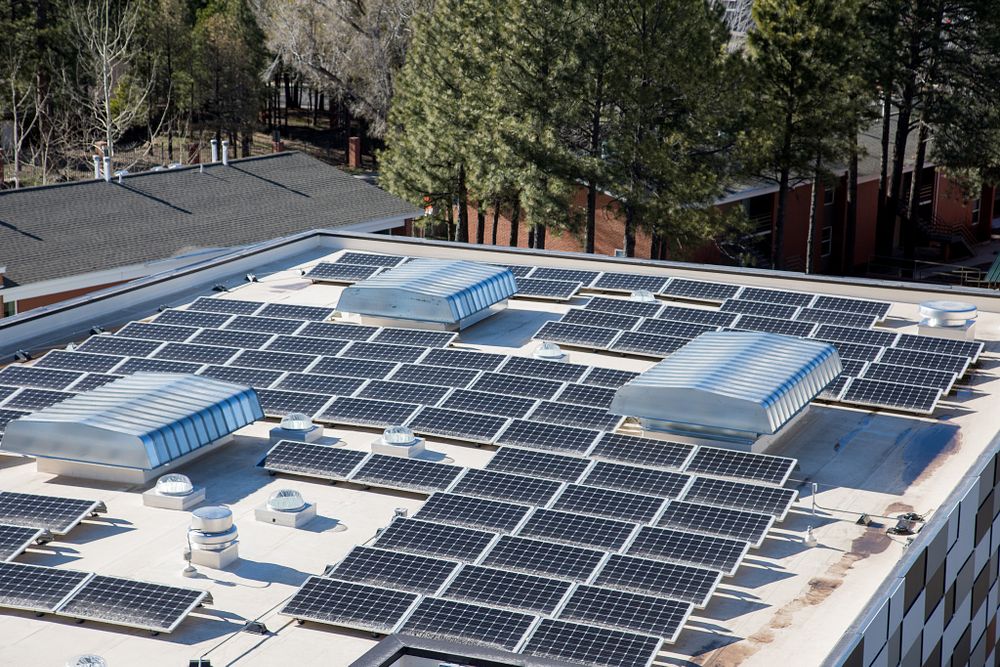Northern Arizona University released its inaugural State of Sustainability report, documenting progress on its path to achieving carbon neutrality by 2030. This comprehensive report highlights NAU’s wide-ranging sustainability efforts, which are integrated into campus life and the broader community, and its responsibility to prepare the next generation of sustainability professionals.
“NAU’s goal is to achieve carbon neutrality by 2030, and the State of Sustainability report documents meaningful steps take to-date on this most pressing of global challenges,” NAU President José Luis Cruz Rivera said. “We know that this ambitious target cannot be achieved by words alone, and I am proud of the intentional commitment, investment of appropriate resources, and willingness to take on difficult challenges that our university community has demonstrated in pursuit of this vital goal.”
The action plan, which was developed over the course of several years with input from students, faculty, staff, the community and corporate partners of NAU, includes changing the way the university does business, including maintenance, transit, groundskeeping, commuting, printing and infrastructure; decarbonizing utilities; educating people at every level to promote small efforts that can make a big difference; and working with the community to ensure broad, holistic programs are in place for long-term sustainability efforts. It also includes financial savings for the university.
“The achievements in this report reflect effective university leadership and deep collaboration with committed faculty, staff and students across campus to advance the sustainable stewardship of resources and drive progress on our Carbon Neutrality goal,” said Chief Sustainability Officer Erik Nielsen. “We made real progress in this past year and have an ambitious agenda for this academic year. Working together, NAU will drive decarbonization of campus and establish itself as a leader in university climate action.”
Although the plan is new, NAU has made significant strides in the past year on the road to decarbonization. Among other things, the university:
- Reduced natural gas consumption by 13%, water by 14% and electricity by 4.6% compared to last year
- Collaborated with the NAU Center for Service and Volunteerism to establish the AZ Climate Resiliency Corps Americorps program and host six NAU students in the Office of Sustainability
- Deployed a uniform recycling program to make it easier for people in all buildings to recycle
- Established a pilot project for reusable dining ware at select dining locations
- Obtained nearly $140,000 in energy efficiency rebates
- Changed the vehicle purchasing policy to require the purchase of electric vehicles unless there is a clear case that an EV will not be able to do a comparable job
- Made efficiency upgrades in the Skydome and Babbitt Administration Center, with upgrades for SBS Castro scheduled, saving almost $160,000 and 1.64 million kilowatt-hours of electricity a year
- Obtained the fifth Association for the Advancement of Sustainability in Higher Education STARS gold rating with the highest score ever and received special recognition for water reduction in the 2024 Sustainable Campus Index
The NAU Green Fund, a student-run program funded by student fees, plays an important role in advancing sustainability work throughout campus. Their efforts in the last year have included a program for reusable food containers in the dining halls, purchasing electric grounds equipment and electric facilities vehicles, revitalizing yellow bikes, installing utility meters on selected buildings, funding research and sponsoring events to raise awareness of activities like urban gardening. The Green Fund allows students to help NAU decide how to promote sustainability.
Future sustainability plans include:
- Initiating a public-private partnership to decarbonize and modernize NAU’s direct emissions for heating and cooling and procuring renewable electricity.
- Replacing non-functional turfgrass with drought-tolerant native landscaping and installing smart water sensors funded by a $700,000 water conservation grant from the Arizona Water Infrastructure Authority
- Enhancing climate literacy at NAU
- Initiating electrification of NAU shuttle buses
Heidi Toth | NAU Communications
(928) 523-8737 | heidi.toth@nau.edu




